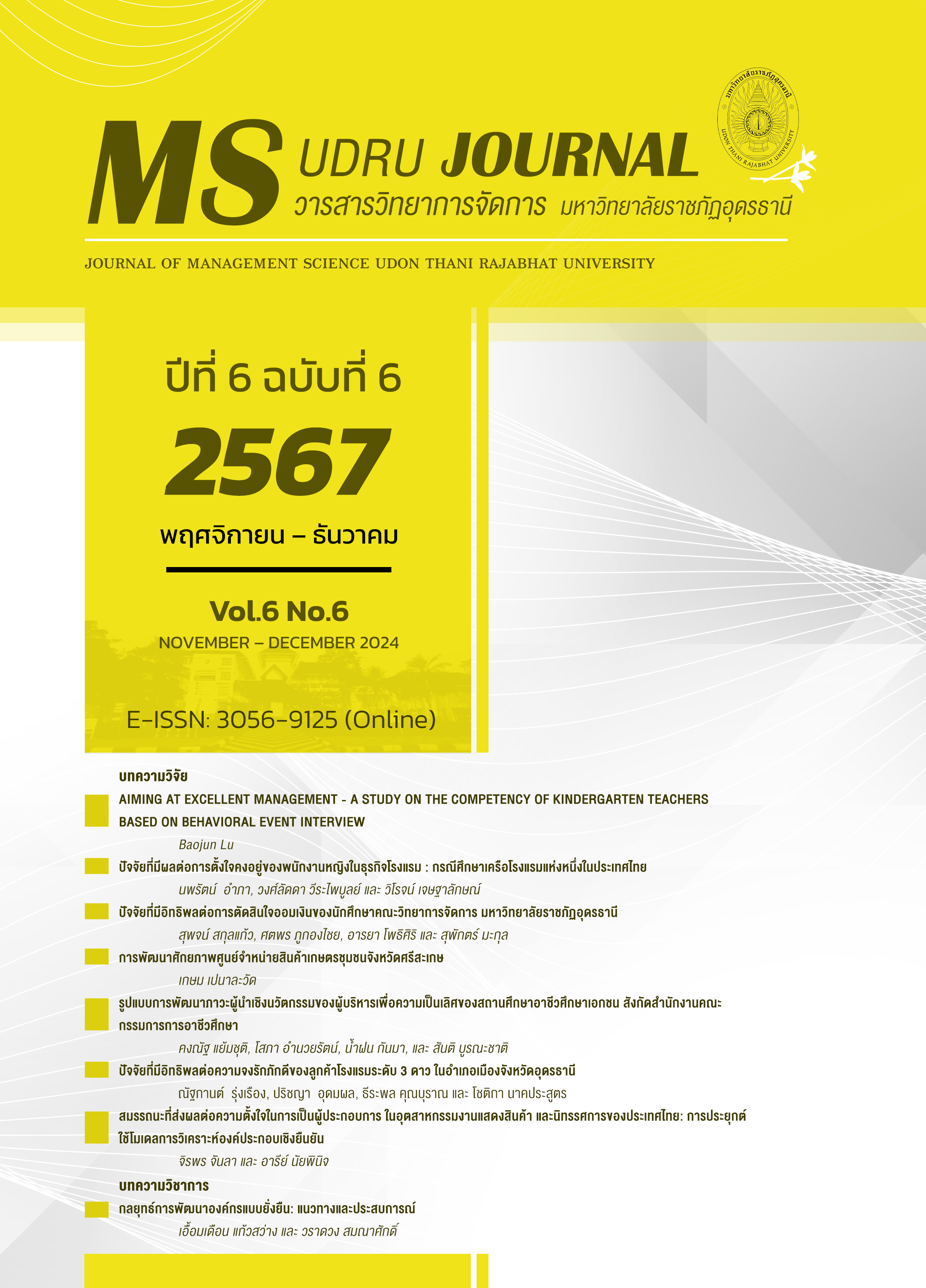กลยุทธ์การพัฒนาองค์กรแบบยั่งยืน: แนวทางและประสบการณ์
Main Article Content
บทคัดย่อ
การปรับตัวและพัฒนาองค์กรให้สามารถอยู่รอดและเติบโตอย่างยั่งยืนในสภาวะที่โลกปัจจุบันต้องเผชิญกับความท้าทายทางสังคมและสิ่งแวดล้อมที่เพิ่มขึ้นไม่หยุดหย่อน เป็นเรื่องที่องค์กรต่าง ๆ ต้องให้ความสำคัญอย่างมาก บทความนี้ได้ทำการสำรวจและวิเคราะห์หลักการเกี่ยวกับกลยุทธ์การพัฒนาองค์กรแบบยั่งยืน โดยเน้นการรวมการพัฒนาทางเศรษฐกิจ สังคม และสิ่งแวดล้อมเข้าด้วยกัน ผ่านการศึกษากรณีขององค์กรที่ประสบความสำเร็จ บทความนี้แสดงให้เห็นถึงความรู้และประสบการณ์ที่สามารถช่วยให้องค์กรอื่น ๆ ออกแบบและดำเนินกลยุทธ์การพัฒนาแบบยั่งยืนได้อย่างมีประสิทธิผล
ผลการศึกษาชี้ให้เห็นว่า การมีวิสัยทัศน์ที่ชัดเจน การมีส่วนร่วมของพนักงานในทุกระดับ การใช้นวัตกรรมและเทคโนโลยี รวมถึงการวางแผนและการจัดการที่มีประสิทธิภาพ เป็นปัจจัยสำคัญที่นำไปสู่ความสำเร็จในการพัฒนาองค์กรแบบยั่งยืน โดยเฉพาะการสร้างความสมดุลในด้านเศรษฐกิจ สังคม และสิ่งแวดล้อม องค์กรจำเป็นต้องบริหารเงินทุนและองค์ความรู้ภายในอย่างเหมาะสม รวมถึงการพัฒนาพนักงานและสร้างความร่วมมือกับภาคีเครือข่ายภายนอก เช่น พันธมิตรทางธุรกิจและการแบ่งปันทรัพยากร เพื่อขับเคลื่อนการเติบโตทางเศรษฐกิจและเสริมสร้างความมั่นคงในระยะยาว ทั้งนี้ การใช้นวัตกรรมและเทคโนโลยีในการพัฒนาธุรกิจและการเพิ่มยอดขายถือเป็นกลยุทธ์สำคัญ บทความนี้มุ่งเสนอวิธีการและแนวทางที่เป็นประโยชน์สำหรับผู้บริหารและผู้นำองค์กรที่ต้องการนำพาองค์กรเข้าสู่การพัฒนาที่ยั่งยืน ซึ่งเป็นกลยุทธ์สำคัญในการสร้างความสำเร็จและความมั่นคงในระยะยาวสำหรับองค์กรในยุคสมัยใหม่
Article Details

อนุญาตภายใต้เงื่อนไข Creative Commons Attribution-NonCommercial-NoDerivatives 4.0 International License.
บทความที่ได้รับการตีพิมพ์เป็นลิขสิทธิ์ของคณะวิทยาการจัดการ มหาวิทยาลัยราชภัฏอุดรธานี
ข้อความที่ปรากฏในบทความแต่ละเรื่องในวารสารวิชาการเล่มนี้
ไม่ใช่ความคิดเห็นและความรับผิดชอบของผู้จัดทำ บรรณาธิการ กองบรรณาธิการ และคณะวิทยาการจัดการ มหาวิทยาลัยราชภัฏอุดรธานี ความรับผิดชอบด้านเนื้อหาและการตรวจร่างบทความแต่ละเรื่องเป็นความคิดเห็นของผู้เขียนบทความแต่ละท่าน
เอกสารอ้างอิง
ธนาคารกสิกรไทย จำกัด (มหาชน). (2565). ธนาคารแห่งความยั่งยืน รายงานการพัฒนาเพื่อความยั่งยืน 2565. กรุงเทพฯ: พญาไท.
บริษัทปูนซีเมนต์ไทย จำกัด (มหาชน). (2564). กรอบการพัฒนาอย่างยั่งยืน เอสซีจี. กรุงเทพฯ: บางซื่อ.
บริษัท โตโยต้า มอเตอร์ ประเทศไทย จำกัด. (2564). Environmental Report 2021. สมุทรปราการ: พระประแดง.
พิริยาภรณ์ อันทอง และศุภกร เอกชัยไพบูลย์. (2559). Checklist พิชิตธุรกิจยั่งยืน เครื่องมือการขับเคลื่อนองค์กรสู่ความยั่งยืน สำหรับธุรกิจที่เพิ่งเริ่มต้นพัฒนาความยั่งยืนในองค์กร. กรุงเทพฯ : ศูนย์พัฒนาความรับผิดชอบต่อสังคม ตลาดหลักทรัพย์แห่งประเทศไทย.
Barbier, E.B. (1987). The concept of sustainable economic development. Environmental Conservation, 14(2), 101-110.
Cepraga, L., & Bîrsan, S. (2023). Approaching Organizational Identity from the Perspective of Sustainable Development. https://doi.org/10.53486/icspm2022.36.
Chams, N., & García-Blandón, J. (2019). On the Importance of Sustainable Human Resource Management for the Adoption of Sustainable Development Goals. Resources, Conservation and Recycling, 141, 109-122. https://doi.org/10.1016/j.resconrec.2018.10.006.
Cho, H., Lee, P., & Shin, C. (2019). Becoming a Sustainable Organization: Focusing on Process, Administrative Innovation and Human Resource Practices. Sustainability, 11, 3554. https://doi.org/10.3390/su11133554.
Dzhengiz T., Riandita A., Broström A. (2023). Configurations of sustainability-oriented textile partnerships. Business Strategy and the Environment, 4392-4412. https://doi.org/10.1002/bse.3372.
Gutterman, A. (2020). Organizational Culture and Sustainability. In Managing Sustainability: A Guide for Executives. https://doi.org/10.4324/9781003055440-11.
Hammadi, F., & Hussain, M. (2019). Sustainable organizational performance: A study of health-care organizations in the United Arab Emirates. International Journal of Organizational Analysis, 27(1), 169-186. https://doi.org/10.1108/IJOA-10-2017-1263.
Long, B. S. (2019). Strategic sustainability: Creating business advantage in the new reality. World Scientific.
Matu, B. J. (2024). The importance of incorporating lived experience and identity in promoting cultural diversity and sustainability in community college and education: a case study of Community College of Allegheny County. International Journal of Sustainability in Higher Education, 25(3), 470-488.
Morandín-Ahuerma, I., Contreras-Hernández, A., Ayala-Ortiz, D. A., Pérez-Maqueo, O. (2019). Socio–Ecosystemic Sustainability. Sustainability, 11(12), 3354. https://doi.org/10.3390/su11123354.
Obrenovic, B., Du, J., Godinic, D., Tsoy, D., & Khudaykulov, A. (2020). Sustaining enterprise operations and productivity during the COVID-19 pandemic: "Enterprise Effectiveness and Sustainability Model". Sustainability, 12, 5981. https://doi.org/10.3390/su12155981.
Orth, R., Kohl, H., & Galeitzke, M. (2020). Sustainable Corporate Development: A Resource-Oriented Approach. In Freitag M., Kotzab H., Pannek J. (eds) Dynamics in Logistics. Lecture Notes in Logistics. Springer, Cham. https://doi.org/10.1007/978-3-030-40390-4_12.
Patagonia. (2020). Annual Benefit Corporation Report. https://www.patagonia.com/on/demandware.static/-/Library-Sites-PatagoniaShared/default/dwf14ad70c/PDF-US/PAT_2019_BCorp_Report.pdf.
Tseng, M. L., Chen, K. L., & Nguyen, T. T. (2022). Enhancing firm value through strategic alignment of circular economy and sustainable supply chain management practices under uncertainty. Resources, Conservation and Recycling, 180, 106181. https://doi.org/10.1016/j.resconrec.2021.106181.
Unilever. (2021). Unilever Annual Report and Accounts 2020. https://www.unilever.com/Images/annual-report-and-accounts-2020_tcm244-559824_en.pdf.
van Zanten, J., & van Tulder, R. (2021). Improving companies' impacts on sustainable development: A nexus approach to the SDGS. Business Strategy and the Environment, 30, 3703-3720. https://doi.org/10.1002/bse.2835.


